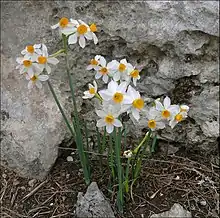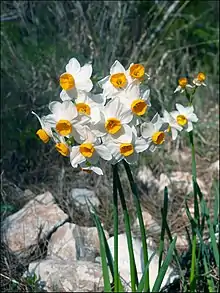Narcissus tazetta
Narcissus tazetta (paperwhite, bunch-flowered narcissus, bunch-flowered daffodil,[1] Chinese sacred lily, cream narcissus, joss flower, polyanthus narcissus) is a perennial ornamental plant that grows from a bulb. Cultivars of N. tazetta include 'Paperwhite', 'Grand Soleil d'Or' and 'Ziva', which are popularly used for forcing indoors, as is the form of N. tazetta known as Chinese Sacred Lily.[2][3][4]
| Paperwhite | |
|---|---|
 | |
| In Israel | |
| Scientific classification | |
| Kingdom: | Plantae |
| Clade: | Tracheophytes |
| Clade: | Angiosperms |
| Clade: | Monocots |
| Order: | Asparagales |
| Family: | Amaryllidaceae |
| Subfamily: | Amaryllidoideae |
| Genus: | Narcissus |
| Species: | N. tazetta |
| Binomial name | |
| Narcissus tazetta | |
Description


Narcissus tazetta is amongst the tallest of the narcissi, and can grow to a height of up to 80 centimetres (31 in),[5] with thin, flat leaves up to 40 centimetres (16 in) long and 15 millimetres (0.59 in) wide. Umbels have as many as 8 flowers, white with a yellow corona.[6][7][8][9][10]
Taxonomy
Subspecies
Six subspecies are accepted by the World Checklist of Selected Plant Families:[11]
- N. tazetta subsp. aureus (Jord. & Fourr.) Baker[12] syn. N. bertolonii – south-east France, Sardinia, north-west Italy, Algeria, Morocco
- N. tazetta subsp. canariensis (Burb.) Baker[13] – Canary Islands
- N. tazetta subsp. chinensis (M.Roem.) Masam. & Yanagih.[14][15] – south-east China, Japan, South Korea
- N. tazetta subsp. corcyrensis (Herb.) Baker[16] – Corfu (Greece)
- N. tazetta subsp. italicus (Ker Gawl.) Baker[13] syn. N. italicus – Mediterranean from southern France to Greece
- N. tazetta subsp. tazetta – widely distributed from the western Mediterranean to Afghanistan
Ecology
Narcissus tazetta contains a fragrant compound found in only a few other plants, including roses and Acnistus arborescens, called orcinol dimethyl ether, which is almost undetectable to the human nose. Experiments with honeybees have shown they can readily detect it.[17]
Distribution
Narcissus tazetta is a widespread species, native to the Mediterranean region from Portugal to Turkey. It is also naturalized across the Middle East, Central Asia, Iran, Afghanistan, Pakistan, India, Nepal and Bhutan, as well as the Canary Islands, China (Fujian, Zhejiang), Japan, Australia, Korea, Norfolk Island, New Zealand, Bermuda, Mexico and the United States (Oregon, California, Texas, Alabama, Arkansas, Florida, Louisiana, Mississippi, North Carolina, South Carolina, Virginia, and West Virginia)[18] and South America.[19]
Uses
Narcissus tazetta is grown commercially for its essential oil, mostly in southern France. An interspecies hybrid, with Narcissus poeticus, is also grown for its essential oil.[20]
References
- BSBI List 2007 (xls). Botanical Society of Britain and Ireland. Archived from the original (xls) on 2015-06-26. Retrieved 2014-10-17.
- Judith Farr; Louise Carter (31 October 2005). The Gardens Of Emily Dickinson. Harvard University Press. p. 252. ISBN 978-0-674-01829-7. Retrieved 25 July 2012.
- Tovah Martin; Brooklyn Botanic Garden (1 March 2000). Old-Fashioned Flowers: Classic Blossoms to Grow in Your Garden. Brooklyn Botanic Garden. p. 14. ISBN 978-1-889538-15-0. Retrieved 28 July 2012.
- H. L. Li (3 December 2002). Chinese Flower Arrangement. Courier Dover Publications. p. 48. ISBN 978-0-486-42316-6. Retrieved 28 July 2012.
- Michaux, Jean (2009). "Narcissus tazetta". La Flore. Académie de Besançon. Retrieved 26 November 2014.
- Linnaeus, Carl von. 1753. Species Plantarum 1: 290 Narcissus tazetta
- Haworth, Adrian Hardy. 1819. Supplementum Plantarum Succulentarum 142, Hermione tazetta
- Rafinesque, Constantine Samuel. 1848. Flora Telluriana 4: 21 Jonquilla tazetta
- Rouy, Georges C. Chr. 1912. Flore de France 13: 40 Narcissus linnaeanus
- Sessé y Lacasta, Martín & Mociño, José Mariano. 1894. Flora Mexicana ed. 2: 85 Pancratium tazetta
- Search for "Narcissus tazetta", World Checklist of Selected Plant Families, Royal Botanic Gardens, Kew, retrieved 2012-12-26
- Baker, John Gilbert. 1888. Handbook of the Amarylldaceae p 9
- Baker, John Gilbert. 1888. Handbook of the Amarylldaceae p 8
- Flora of China v 24 p 269, Narcissus tazetta var. chinensis, common name 水仙 shui xian
- Masamune, Genkei & Yanagihara, Masayuki. 1941. Transactions of the Natural History Society of Formosa 31: 329.
- Baker, John Gilbert. 1888. Handbook of the Amarylldaceae p 7
- Natalia Dudareva; Eran Pichersky (27 March 2006). Biology of Floral Scent. CRC Press. p. 95. ISBN 978-0-8493-2283-9.
- Kew Checklist of Selected Plant Families
- Chile Flora
- Nigel Groom (30 June 1997). The New Perfume Handbook. Springer. pp. 225–226. ISBN 978-0-7514-0403-6. Retrieved 28 July 2012.
Bibliography
Books
- van Kampen et fils, Nicolas (1760). Traité des fleurs à oignons: contenant tout ce qui est nécessaire pour les bien cultiver, fondé sur une expérience de plusieurs années (in French). Harlem: Bohn. Retrieved 26 December 2014. translated into English as (van Kampen & Son 1764)
- van Kampen & Son, Nicolas (1764). The Dutch florist, or, True method of managing all sorts of flowers with bulbous roots (translated (Harrison) from French: (van Kampen et fils 1760)) (2 ed.). London: Baldwin. Retrieved 26 December 2014.
Next to the Hyacinths, Tulips, Ranunculuses, and Anemones, of which we have treated already, the Polyanthus Narcissus holds the first place and demands our chief attention
Articles
- Rivka Dulberger (September 1964). "Flower Dimorphism and Self-Incompatibility in Narcissus tazetta L." Evolution. 18 (3): 361–363. doi:10.1111/j.1558-5646.1964.tb01613.x. JSTOR 2406347. S2CID 88184240.
- ARROYO, JUAN; DAFNI, AMOTS (January 1995). "Variations in habitat, season, flower traits and pollinators in dimorphic Narcissus tazetta L. (Amaryllidaceae) in Israel". New Phytologist. 129 (1): 135–145. doi:10.1111/j.1469-8137.1995.tb03017.x. PMID 33874423.
- Krelage, JH (17 April 1890). "On Polyanthus Narcissi". Journal of the Royal Horticultural Society. 12 (Daffodil Conference and Exhibition): 339–346. Retrieved 25 December 2014.
- Ooi, Linda (Mar 2010). "Narcissus tazetta lectin shows strong inhibitory effects against respiratory syncytial virus, influenza A (H1N1, H3N2, H5N1) and B viruses". Journal of Biosciences (Bangalore). 35 (1): 95–103. doi:10.1007/s12038-010-0012-8. PMC 7091448. PMID 20413914. Retrieved 30 April 2015.